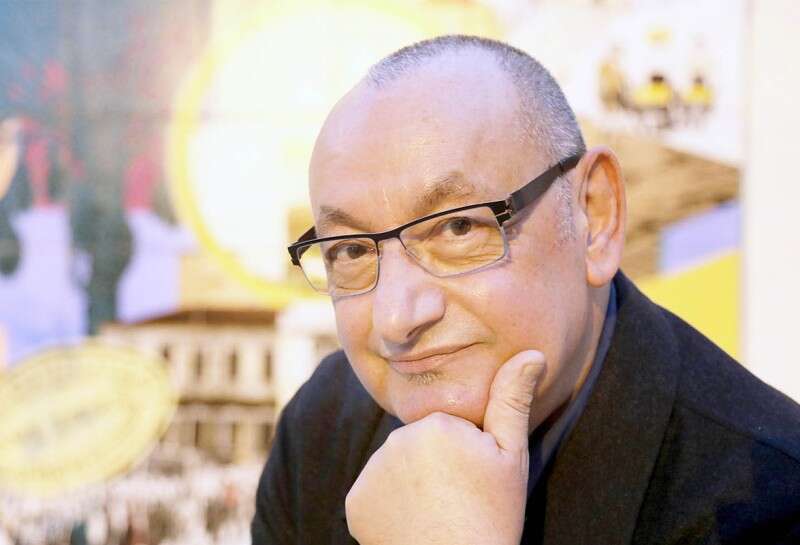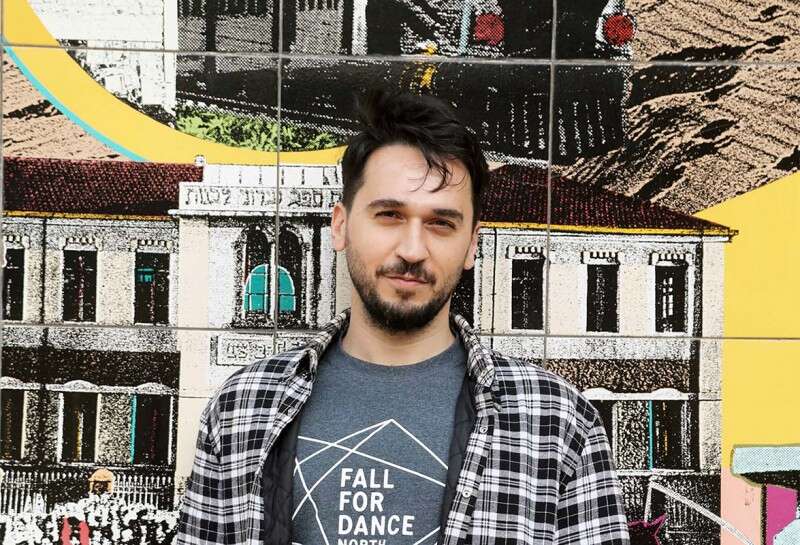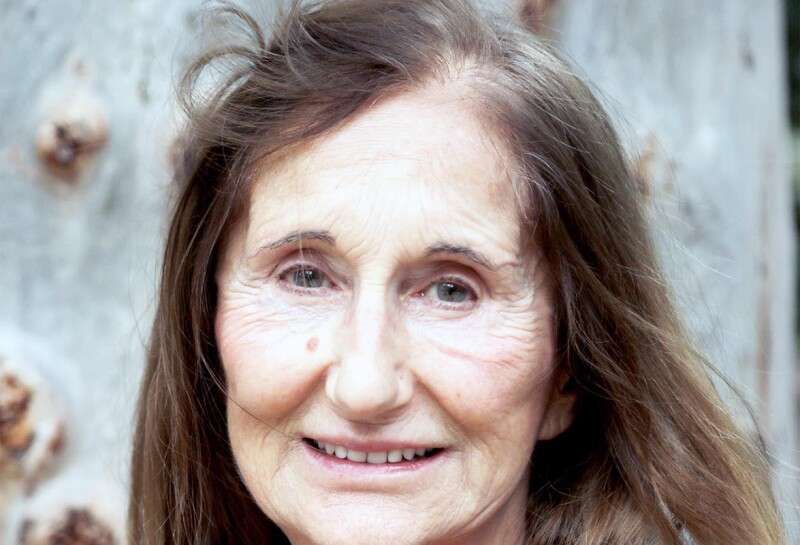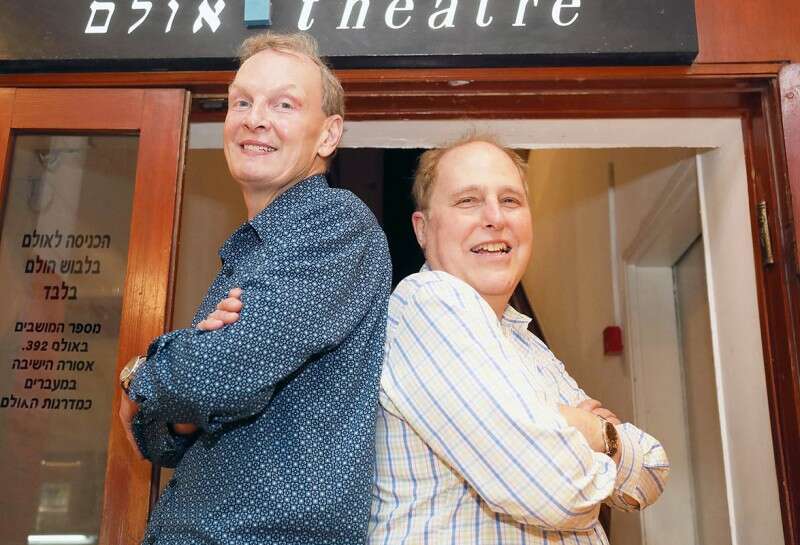"I have no explanation as to how it happened," Yair Vardi, the director of the Suzanne Dellal Center for Dance and Theater, says as he tried to describe what he saw transpire before his eyes. One hundred and eighty representatives from the world of dance arrived in Israel for the center's 24th annual showcase of Israeli contemporary dance last week. For 20 years, the event has drawn festival directors and producers from around the world who seem to want to book ever more Israeli dance troupes with which to fill their calendars with blue and white performances.
From the four corners of the earth, they arrive, all trying to find available dates on which they can book dance troupes like the Kibbutz Contemporary Dance Company and the Inbal Pinto and Avshalom Pollak Dance Company.
"Maybe it's due to the fact that I live this on a daily basis, I didn't notice the tremendous change that took place," Vardi says.
"I can only recall that we set out on our path soon after [late Prime Minister Yitzhak] Rabin's murder. And I contemplated whether we should open the festival and if it was appropriate and if anyone would come. But you see, it is happening. How it happened and what happened, I can't really say exactly. I can say that we worked very hard for this, but that goes without saying. One way or another, it warms my heart when I see and hear the response."
So with the help of guests from five different troupes who attended the festival, we at Israel Hayom tried to figure out how Israel, a country with a small yet strong dance came to dominate modern dance in recent years, years in which BDS [the boycott, divestment and sanctions movement], that same anti-Semitic and Israel-hating organization, has grown in strength, and how Israeli dance came to develop its own DNA, the standard quality and character typical of larger and older nations of dance.
Jean-Paul Montanari is the director of the Montpellier Dance Festival, a world-renowned dance festival in France.
Q: While you are a guest here, in terms of your familiarity with Israeli dance, you are almost one of us. You are always the first to arrive.
"There's something to that. I have followed Israeli dance for decades. I've visited here dozens of times. It's simply fascinating me to see how a small country such as yours produces so many stars and troupes. It must be obvious to you that this is not a trivial matter. This may be dance, but as a phenomenon, it's fascinating – a small, young country that does such things."
Q: Can you try to explain how we have come to dominate dance?
"First of all, you have something to say. I look at all the shows and I know what they want to tell me, what the creator intended, and the dancers do it. It is very conspicuous with Israeli creators. I also think that you Israelis just love to dance and that is of course also part of the Jewish religion. After all, you celebrate in the synagogues with dancing, and your kibbutzim always danced the hora. Dance is the most basic art, and it is in your blood and your tradition. Everyone dances in some way.
"It is also important to remember that you are a nation and a people who carry with you difficult memories and live difficult lives. For you, dance is an expression of uneasy feelings. Your dance comes from a place of release. All of the dancers work hard, but after you go through difficult military service or terror attacks, going and dancing is different than it would be had you grown up somewhere in Europe.

"I don't think the Israeli audience is at all aware of just how dominant Israel is in world dance, just how much it is appreciated."
"I can talk a lot about modern dance and explain, but put simply, you could say that one cannot talk about modern dance now without talking about [Israeli contemporary dancer and choreographer] Ohad Naharin. That's clear to everyone, and I hope that simplifies things a bit. Of course, there is the younger generation, like Hofesh Shechter who works in London, and many more names who work in various locations in Europe. After all, we put a spotlight on Israel at the festival a few years back, and we dedicated it to Israeli art. That is enough for you to understand that Tel Aviv is the capital of world dance. We did not do that without good reason, but because we thought Israeli dance is something that deserves special attention."
Q: You tend to invite Israeli troupes to your festival, but in recent years, given the spread of BDS, this has become a difficult task.
"It's true. When Ohad Naharin came to us a few years ago, people cursed and threw things at him, and we got a lot of criticism. One year later, we needed security. And still, we looked up [at the seats] above us and saw people protesting him. Naharin, for example, is one of those who is afforded the type of respect not many receive in Paris, but when you look back through the years, you see that in the rural areas of France, they weren't so quick to invite him, and it's interesting [to think] why [that was the case]. I try to politely explain to all those who complain that one must differentiate between a person and his art and judge him by his art. And in general, of course, a majority of dancers hold opinions defined as leftist in Israel."
Q: And if that doesn't help, these are after all dense people who are unwilling to see the whole picture and separate dance from politics.
"Oh, then, I politely tell them, "F**k you."
Ilter Ibrahimof is the artistic director of Toronto's premier international dance festival Fall for Dance North, the Canadian version of New York City's Fall for Dance festival.

Born to a Jewish family in Istanbul, Ibrahimof fell in love with acting at an early age. He later moved to the U.S., where he went to college and would go on to discover the world of dance. After 20 years in the business, he was offered a job in Toronto.
Q: As artistic director of Fall for Dance North, what do you look for when you check out performances around the world?
"The statement, like the one you see when you watch Israeli men and women dance. I was exposed to Israeli dance at a very young age, and ever since it was clear I would continue to follow it. At the same time, it was nice to see how Israeli dance made a name for itself in the world, even though, for those who have been following it, there was never any doubt it would happen."
Q: What is your definition of Israeli dance?
"I think Israeli dance is not detached from the behavior of the Israeli on the street, and therein lies its uniqueness: very direct, does not beat around the bush and so forceful that it cannot be ignored. This is also how you talk in your day-to-day lives, is it not? For someone who doesn't know you, this may be too aggressive. But to me, it's honesty.
Q: Does the audience that comes to watch dance performances in Toronto look for Israeli troupes?
"Certainly. Your dance has many fans around the world, and rightfully so. Nowadays, you can't afford to not have Israeli dance in your program. People know how to recognize Israeli dance and they know troupes, and that's why they fill the performance halls when Israeli dance troupes come to town."
Q: Do you perhaps have an explanation as to why so many Israelis are drawn to the field of dance?
"I think you aren't scared of hard work, especially if there is a payoff. A dancer that has gotten past the hard parts will have his moment of fame but also an interesting life. The Israeli dancers travel all around the world, see places, meet people and do what they love. I think that for me, that is the meaning of life."
Nicole Saïd, director of France's Preljocaj Ballet is considered a legend in the field. Given her experience, I ask Saïd how many minutes into a performance she knows if she will include it in the festival
"Usually after five minutes I will recognize if there is something here that suits me and could become a hit," she said. "Something that when they hear the applause in the hall later in the year after the performance, I will say, 'I hit the nail on the head.'"
Q: You work with Angelin Preljocaj, one of the most intimidating figures in the field.
"Yes, and he is very precise and knows exactly what he's looking for. I wouldn't say he's intimidating, though maybe a little tough. With him, dance is a very precise act. That is why Israelis are very popular with him. You are disciplined and precise, that's what we are looking for. I think that maybe that stems from your military service, combined with this machoism and manliness. You are very reminiscent of the Cubans in your dance, because for them, it's also connected to the military. It is nice to see that you already have your own identity and your own signature, isn't it?"

Q: It seems that in Israel, although dance along with Israeli cinema is very dominant around the world, is fated to remain a niche subject.
"That's obvious. Other than former Soviet countries, dance is always a niche art. You think that in France the situation is much better? Not at all. Dance was and remains a very narrow milieu. The country may support it and the towns want dance, but the audience is the same all over the world, except for say Paris, where there are a lot of tourists."
Q: In the last three years, BDS has arrived on the dance scene in a big way.
"Absolutely. Not a week goes by that we don't receive letters asking for an explanation why we decided to an invite a troupe from Israel, and if we know that Israel is an apartheid state. I'll tell you something, this is classic French anti-Semitism. They of course say they are anti-Israel, but that is just an excuse. They are anti-Semites who can afford to raise their heads in the current public atmosphere in France."
Q: To what extent does it impact the choices you make?
"It doesn't. We judge people by their dance, their professionalism and their art. I go all over the world, I'm on planes and on the road for most of the year. I don't see any of us asking to boycott Russian or South American dance troupes when Russia or countries in South America violate rights or act aggressively. That is why it's anti-Semitism, and I do not relate to anti-Semites, they are irrelevant to me."
Q: In France, they say dance does not belong to the country, but the city that presents itself in the dance.
"I agree with that thesis. I know that Israeli dance is mainly in Tel Aviv. I know and have known Suzanne Dellal for years. Maybe that is something that should concern you as citizens, that this separation between Tel Aviv and the State of Israel is gradually increasing from a global standpoint. It's not connected to BDS, it's connected to you and how you see your country in the years that come."

Portland is one of the most important cities in the U.S. for modern dance, and Walter Jaffe and Paul King, the managers of the city's White Bird dance theater offer us a few explanations why.
"First of all, our central geographical location. Second of all, the city's dance traditions and mainly the population. We have a warm audience that understands dance, and artists want to come perform here. It could also have something to do with New York's changing status in recent years. Mikhail Baryshnikov was one of the first to come and perform when we opened the theater two decades ago."
Q: How is Israeli dance depicted in the U.S.?
Our fans know and look for Israeli dance in the annual program. Certainly. The audience can recognize Israeli troupes, certainly the largest, most important ones that have already performed quite a few times with us throughout history. We are looking to innovate and look for dance troupes not just from Tel Aviv but also visiting [troupes] from Jerusalem and always looking for new things. The tickets to those shows sell out way in advance."
Q: Is the American dance scene less impacted by BDS than in Europe?
"No. We are contacted every time we bring an Israeli troupe or announce it and asked what is so urgent about bringing an Israeli troupe in light of what the country is doing to the Palestinians. There is always a reaction to it. Don't forget, we are a very white city, with a small but strong Jewish community that traditionally found its place by contributing a great deal to cultural institutions."
Q: To what extent does BDS impact your decision to book an Israeli troupe?
"It doesn't at all. We will bring any good dance performance. Anyone who doesn't bring at least one Israeli dance performance to their festivals and events is simply missing out on excellence dance. Yes, that means we will have to continue to explain, as we have for the past three years, that these dancers have nothing to do with politics and they must be judged by their art. From our perspective, as soon as the lights go on after the show and everyone is on their feet and applauding the troupe from Israel, we know we were right. For us, that's the most important thing."




